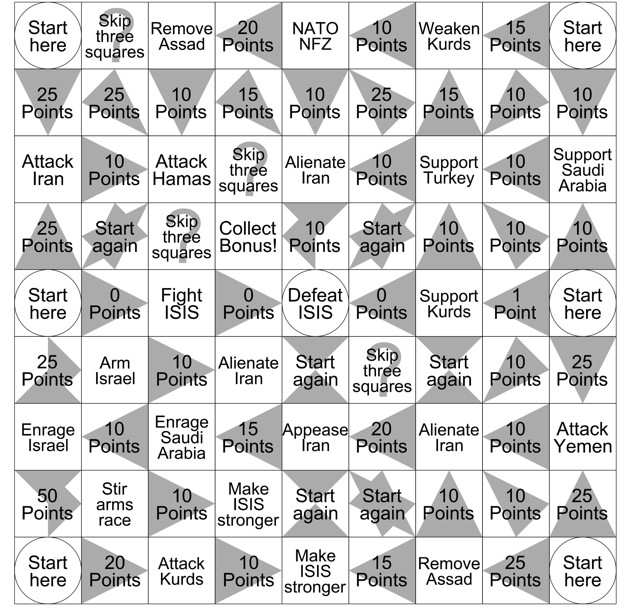JUL 31, 2015
 Everyone with a stake in Middle Eastern geopolitics publicly declares that ISIS must be defeated. Yet opinions range widely on how this should be achieved.
Everyone with a stake in Middle Eastern geopolitics publicly declares that ISIS must be defeated. Yet opinions range widely on how this should be achieved.
Saudi Arabia, for example, believes ISIS cannot be defeated unless Syrian President Bashar al-Assad is removed from power. Turkey has just convincedNATO nations that the war against ISIS can only be won if Turkey’s traditional Kurdish opponents are neutralized first. Israel sees only one way to defeat ISIS: destroy Iran’s nuclear program and clip its wings regionally.
 The Confused Person's Guide to Middle East ConflictSo what explains these apparently contradictory aims? The cynical view would be that all these parties are less interested in defeating ISIS than in achieving their own regional goals, and that they’re only pretending to be concerned about wiping out the group. Clearly, however, there is no place for cynicism in Middle Eastern politics. Everyone involved in the region is known to be sincere, albeit in radically different ways.
The Confused Person's Guide to Middle East ConflictSo what explains these apparently contradictory aims? The cynical view would be that all these parties are less interested in defeating ISIS than in achieving their own regional goals, and that they’re only pretending to be concerned about wiping out the group. Clearly, however, there is no place for cynicism in Middle Eastern politics. Everyone involved in the region is known to be sincere, albeit in radically different ways.
A detailed analysis of the situation by the Institute of Internet Diagrams has led to a surprising discovery: It appears that all the players confronting ISIS are competing to see who can devise the largest number of steps, and most convoluted strategy, to overcome the Islamic State. We at the Institute are not sure why they are doing this, but our simulation suggests that they are secretly playing some sort of game. Few other explanations have been judged credible.
Leveraging all available data, we have mapped the various steps onto the diagram below, which seems to resemble a board game, thus confirming our theory.
 Institute of Internet Diagrams / @karlremarks 2015Here are some of the scenarios that are unfolding:
Institute of Internet Diagrams / @karlremarks 2015Here are some of the scenarios that are unfolding:
Saudi Arabia proposes first dislodging President Assad in Syria, one of ISIS’s principal enemies, which will in turn strengthen the Islamic State. That may seem like a step backward, but fear not: There’s more. The Saudis will then attack Yemen to defeat the Houthis, who are allied with Iran. This will distract Iran in its fight against ISIS. The Kingdom will also draw other Arab countries away from U.S.-led airstrikes against the Islamic State in Syria and Iraq so that these states can participate in Saudi-led strikes in Yemen. Where, you ask, does defeating ISIS fit into all this? You may have missed it: Please return to the start of this paragraph.
Turkey has advanced the idea that defeating ISIS will require attacking the Kurdish factions who are doing the most to fight the Islamic State in Syria and Iraq, thereby easing the pressure on ISIS. The Turks will then offset this by alsodemanding the removal of Assad, and by asking their Western allies to deflect resources away from fighting ISIS and toward creating a “safe zone” in Syria. Turkey will subsequently move to weaken Western and NATO support for Kurdish fighters, turning the Kurds into both an ally and enemy of the West. This will so utterly confuse ISIS that the group will commit major strategic mistakes.
The Kurds believe the only way to defeat ISIS is to fight it. It’s a disappointingly simple strategy.Iran’s plan for defeating ISIS relies heavily on arming Shia groups, thus giving the impression that the war against ISIS is a Sunni-Shia conflict. While this might appear to bolster ISIS’s propagandistic claims that it is defending Sunnis against Shia aggression, Iran will dispel this illusion by encouraging non-Shia groups battling ISIS to also fight under Shia banners.
Israel’s blueprint is quite straightforward by comparison: ISIS can only be defeated after Iran, which is fighting ISIS, is contained and defeated. Prime Minister Benjamin Netanyahu cleverly unified these aims by calling Iran “the Islamic State of Iran.” No other leader has ever tried to conduct geopolitics through wordplay before, but the strategy seems to be gaining momentum. The popularity of the phrase “the ISIS of …” to describe things one hates attests to the resonance of this approach. Israel plans to escalate its anti-ISIS campaign by referring to anyone who opposes Israel as “ISIS,” including Hamas (the ISIS of Gaza), Hezbollah (the ISIS of Lebanon), and Sweden (the ISIS of Scandinavia).
America’s strategy is substantially different from everyone else’s. President Barack Obama wants to defeat ISIS by not appearing to be the force defeating ISIS. This is a difficult task, particularly when your air force is the one carrying out most operations against ISIS targets. But Obama is an astute strategist. His plan centers on supporting Kurdish factions as he also supports Turkey which is now attacking the Kurds while also supporting Saudi Arabia in its war in Yemen which upsets Iran whom U.S. forces are collaborating with in fighting ISIS in Iraq as he simultaneously yields to pressure from allies to weaken Assad in Syria which complicates things further with Iran which he pacifies by signing the nuclear deal upsetting America’s traditional friend Israel whose anger is absorbed with shipments of advanced weapons escalating the arms race in the region.
The Kurds, meanwhile, believe the only way to defeat ISIS is to fight it. It’s a disappointingly simple strategy. The Institute’s sources suggest that the Kurds have yet to earn any points in the game, and may no longer even be playing
No comments:
Post a Comment